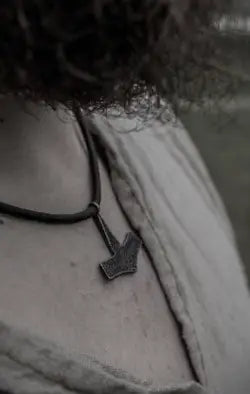Your Cart is Empty
Menu
-
- Shop by Type
- End of Line Sale Items
- New In
- Viking Gifts Under $40
- Hand Forged Axes
- Silver Viking Jewelry
- Stainless Steel Jewelry
- Cremation Jewelry
- Necklaces and Pendants
- Hand Carved Wooden Pendants
- Kings Chains
- Viking Drinking Horns
- Pendant Chains
- Rings
- Bracelets
- Earrings
- Beard Beads and Beard Rings
- Collectables
- Ceramic Mugs
- Street Wear
- Horn Jewelry
- Bronze and Pewter Jewelry
- Shop by Theme
- Viking Axe
- Celtic Jewelry
- Dragon or Serpent
- Viking Raven
- Wolf / Fenrir
- Rune Jewelry
- Odin Jewelry
- Ram / Goat
- Shieldmaidens / Lagertha
- Sword, Spear or Arrow
- Thor's Hammer / Mjolnir
- Tree of Life / Yggdrasil
- Helm of Awe / Aegishjalmur
- Triquetra or Triskelion
- Valknut / Knot of Slain
- Vegvisir / Viking Compass
- Veles / Bear
- Blogs
- Help
-
- Login

Journey Into The Past: Origins And Legends Of The Norse Mythology Necklace

In the realms of ancient Norse culture and mythology, the enigmatic allure of a Norse mythology necklace has captivated generations with timeless significance. Steeped in the rich tapestry of Nordic legends and beliefs, these pieces hold tales of gods, heroes and the interplay between the mortal and the divine. In this guide, we’ll be discussing what it means to wear a Norse mythology necklace, and exploring some of the most powerful symbols you can choose from when you add a new piece to your Viking jewelry collection.
What Does It Mean To Wear A Norse Mythology Necklace?
Depending on an individual’s personal beliefs, interests and cultural connections, there’s a huge range of reasons why someone might wear a Norse mythology necklace – here are some of our favorite interpretations:
- Connection to Norse Heritage: For individuals with Norse ancestry or a strong affinity for Norse culture, wearing a Norse mythology necklace can be a great way to honor and connect with their roots and heritage.
- Symbol of Strength and Protection: Some people wear Norse mythology necklaces, such as Mjölnir (Thor's hammer) or the Helm of Awe, as symbols of strength, courage, and protection. These symbols have historical associations with war and warriors, and wearing them may provide a sense of empowerment and security.
- Embracing Norse Wisdom and Values: Norse mythology is rich in wisdom, poetry, and life lessons. Wearing a necklace with symbols representing these teachings can be a way to embrace and embody those values in daily life.
- Aesthetic and Fashion Statement: You don’t need a specific reason to wear Viking fashion – many people wear a Norse mythology necklace simply because they find the designs aesthetically appealing or fashionable, and it’s a brilliant way to elevate your personal style!
Odin Norse Mythology Necklace: An Ode To The Protector of Heroes
In Norse mythology, Odin is one of the principal gods and the ruler of Asgard, the realm of the Aesir gods. He is often considered the most powerful and wise of all the Norse gods, and plays a central role in the Norse pantheon. Symbols closely related to Odin, such as his spear or horn, are regularly portrayed in Viking jewelry, as his attributes like war, poetry, wisdom, knowledge and magic are popular among Norse enthusiasts.
Odin is a complex deity, embodying both noble and cunning characteristics, but he is perhaps most well-known for his insatiable thirst for knowledge and his willingness to sacrifice himself in pursuit of wisdom. According to myth, Odin hung himself from the world tree Yggdrasil for nine days and nights, pierced by his own spear, to gain the knowledge of the runes, the ancient Norse alphabet, and a form of magical knowledge.
Wearing an Odin necklace is therefore more of a modern cultural trend and personal belief, rather than something rooted in traditional Norse mythology. People may choose to wear an Odin necklace as a symbol of their admiration for the character of Odin and what he represents in terms of wisdom, courage, and mystical knowledge.
The Tree of Life As A Norse Mythology Necklace
In Norse mythology, the Tree of Life is known as Yggdrasil (pronounced "IGG-drah-sil"). Yggdrasil is a massive and sacred cosmic tree that serves as a central and vital element of the Norse cosmology, connecting and supporting the nine worlds in the Norse cosmos that represent the entire universe. Described as an immense ash tree, with its branches stretching across the heavens and its roots delving deep into the underworld, it is often depicted as a symbol of life, continuity, and the interconnectedness of all things in the universe.
The three main roots of Yggdrasil are connected to three important locations:
- One root leads to Asgard, the realm of the Aesir gods, where Odin, Thor, and other major deities reside.
- Another root leads to Midgard, the realm of humans.
- The third root leads to Niflheim, the icy realm of the dead.
Owing to its spiritual roots, Yggdrasil is sustained and protected by three sacred beings:
- The Norns: Three female beings who weave the fabric of fate and destiny for all creatures. They reside near the well of Urd, which lies at the base of Yggdrasil.
- The dragon Nidhogg: A serpent-like creature that gnaws at the roots of the tree, representing decay and destruction.
- An unnamed eagle: Perched on the topmost branches of Yggdrasil, this eagle is said to have knowledge of many things.
The concept of Yggdrasil and its interconnected realms plays a significant role in various Norse myths, sagas, and poems, emphasizing the cyclical nature of life, death, and rebirth in Norse belief. It is a powerful symbol of the Norse worldview and the cosmic order that governs their understanding of the universe, making it perfect for modern day Vikings who want to embrace their Norse heritage.
A Mjolnir Norse Mythology Necklace: The Strength Of A God
Mjölnir, or Thor’s Hammer, is a mythical weapon in Norse mythology famously associated with the Norse god Thor, capable of causing great destruction and protecting Asgard, the realm of the gods.
According to the mythology, the hammer was forged using powerful magic, and its creators, Brokkr and Eitri, imbued it with special properties. Mjölnir's most prominent features include being nearly impossible to lift by anyone deemed unworthy, its ability to return to Thor's hand when thrown, and its capacity to create powerful thunder and lightning when swung.
Mjölnir played a central role in various Norse myths and sagas, where Thor used it to defeat giants, monsters, and other enemies of the gods. However, it was also a symbol of his strength, so for individuals who want to carry with them a sense of protection, this is a fantastic option for a Norse mythology necklace.

The Helm of Awe: Protective Properties On A Norse Mythology Necklace
One of the most mysterious symbols in Viking mythology, the Helm of Awe, also known as Ægishjálmr, is a unique way to introduce Nordic protection and serenity into your life. This powerful and enigmatic symbol is described in the Icelandic grimoires - medieval books of magic and occult practices. It is depicted as a magical and protective symbol in the shape of eight arms radiating from a central point, forming an eight-pointed star or a wheel-like pattern. Each arm has a triangular shape, and the symbol sometimes features a circle in the center.
The primary purpose of the Helm of Awe was to provide protection and instill fear in one's enemies. Warriors would draw the symbol on their forehead, between their eyes, or on their weapons and shields, believing it would grant them strength, courage, and protection in battle. Because of its mystical connotations, it was also believed to possess the power to control the thoughts and minds of others, inducing fear and confusion in adversaries which made them hesitant or unable to attack.
Today, the Helm of Awe is a popular symbol in contemporary Norse and Viking-inspired art, jewelry, and tattoos. People may use it as a representation of strength, protection, and a connection to Norse heritage and mythology.
Whichever symbol you choose for your Norse mythology necklace, you can be certain that you’ll be protected by the ancient powers of the Vikings when you add a symbolic piece to your Norse jewelry collection.
